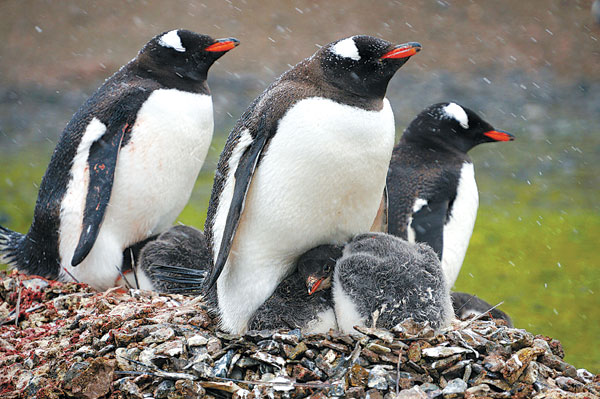The lands at the ends of the earth
 |
|
Penguins guarding their chicks. Provided to China Daily |
China's economic growth and the subsequent rise in the general standard of living mean that travel to the Antarctic and the Arctic is no longer a privilege enjoyed only by scientific researchers. An increasing number of businesspeople and white-collar workers are taking the opportunity to visit the world's last great wildernesses, and travel agencies are cashing in on the rising demand with an increasing number of tours to the polar regions.
"Our association was established in 1989, but before 2009 our trips (to the poles) were exclusively related to scientific research. We extended our services to the general public in 2010 and about 40 people joined our tours to the poles. Customer numbers have risen sharply and we've taken more than 100 people already this year. Several more groups are set to visit before the end of the year," said Li Zijing of the China Association for Scientific Expedition.
"Our business will boom next year because, in addition to the general customers, we will also organize a trip for a team of about 100 students," he said.
|
|
In 2009, 452 Chinese visited the Antarctic and the number rose to 612 in 2010, according to the International Association of Antarctica Tour Operators, an organization dedicated to appropriate, safe and environmentally sound private-sector travel to the region.
Meanwhile, most Chinese travel agencies have now launched polar travel products to provide services for high-end customers. Business is increasing every year.
"In 2009, just 24 people took our first trips to the poles, but in 2010, the numbers increased to 111 to Antarctica and 100 to the Arctic. This year's season hasn't finished yet, but it's sure to register a large increase," said Yu Xueyong, vice-president of Souluniq International Travel Club in Guangzhou, one of China's largest clubs for high-end travelers.
"Our club members are mainly high-income individuals between the ages of 35 to 45. Seventy-four percent of our members are private entrepreneurs, 17 percent are venture capitalists or from private-equity backgrounds, while the rest are company executives and white-collar workers," said Yu.
Chen Jie, product research and development director of Caissa Touristic Co, a Sino-German enterprise, said most of the company's polar tourists are successful individuals aged 35 and older. They generally have stable and comparatively high-income jobs in industries such as information technology and finance.
|
Related Video: |
|
|















